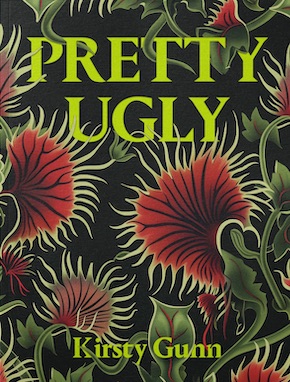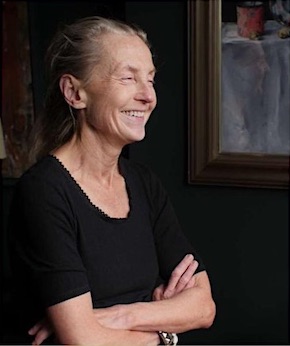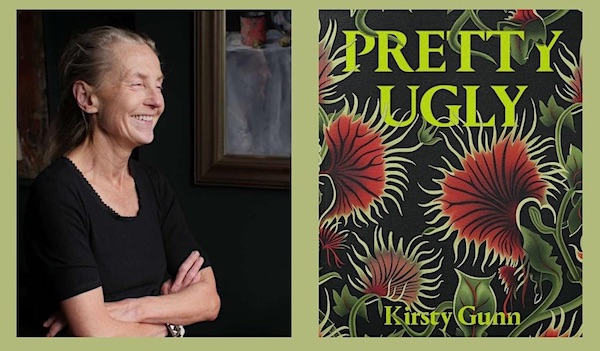A perfect life
by Kirsty Gunn
THERE WAS SOMETHING WRONG with the garden. You couldn’t see it, nothing was obvious. There were no strange plants organised in certain shapes, or sinister looking growths and weeds; the paths were orderly, and the lawns. Roses grew, and pinks, in the places that had been set there for them, and in autumn, berries came out on the crab apple trees along the west side of the wall beside the vegetable plot. It was lovely, actually.
Even so, something was not right. And never had been. Venetia, ‘the beautiful Venice’ her husband Richard called her – might have pointed, with a long, white finger, to the stunted pines that clung together by the gate and boundary. Those stiff black branches that would wave wildly in a storm, she could have used them by way of example. But they were nothing out of the ordinary either. Douglas firs were good for a garden, Richard said; they massed and gave protection. Half the reason they could grow the things they did, he told her, was because of those strong trees that you could see from her study window.
‘Like sentinels,’ is how Richard described them.
He loved it, the garden.
‘It is everything to me,’ he joked. ‘More than the house, even.’
‘Not more than me, though, surely?’ Venetia – ‘the beautiful Venice’ – his city of palazzos and canals, would say to him, in return.
And ‘silly’ would be his unchanging reply.
So forget about a place of odd or frightening plants with thorns or savage leaves and stalks, Richard had made it a haven, the three quarters of an acre that surrounded their home, and a haven it had been when they’d first moved here, all those years ago before the children were born. He used the word ‘haven’ then. Because after the stresses of his City job, there it was, a safe place for the two of them with everything growing and flourishing as it should…
And they still talked about it that way, didn’t they? That the garden, like everything, everything in their life, would be just as they would want it? It was a conversation between the two of them that had factored a sort of faith in the decisions that they had made together. A belief. Only the reality was, Venetia knew, that the wife who each day applied fresh make-up to her face, drawing on, before the mirror, a fine dark pink or crimson lipstick mouth, also knew the very earth from which the garden was made held something secretive and so peculiar that it could spoil everything. And that it was there, that knowledge, and that the garden had the capacity to keep it, no matter what she and Richard said, long after their deaths. Forever actually. It was bedded in.
The reality was, Venetia knew, that the very earth from which the garden was made held something secretive and so peculiar that it could spoil everything.”
She never spoke about any of this out loud, of course. Instead, she went out in the mornings with her cup of coffee, her favourite cup, the one with the golden rim, and looked across the lawns, admiring the hedge by the gate with its uniform shape, the fuchsia and honeysuckle in the far corner. It had been such a long time now, since they’d moved here and fashioned the garden to be the way it was, so why not – irrespective of her feelings – admire it? After all, nothing had changed. The family had all been well, there’d been no concerns, or disappointments. She and Richard were in good health, and he’d made so much money in that job of his they couldn’t help but feel contented, the four children grown up with families and careers of their own… It’s true, Venetia, the lovely Venetia thought, as she arranged one of her pale blue or rose or emerald-coloured shawls around her shoulders, that she’d had nothing, nothing to trouble her through this long period of marriage and family, of domestic life. In fact, you might say she’d had everything for herself that she might have expected. You could use this phrase, if you like: A perfect life.
‘My Beautiful Venice.’ ‘My city of palazzos and canals…’
Yet sometimes, when she stood in front of the mirror after applying that lipstick of hers in the morning, or when removing her make-up at night, she might open her mouth so wide she could see right inside herself, into her own dark workings.
And she might think about it again then, the garden… That a place may have another, shrunken life within it, a sort of shadow, was it? Another self? The feeling then that she was part of a something else that was a separate story altogether, a place of plots, of hidden corners and depths, that contained within it all of who she really was.
Yes, she might think about that. But she need never say.
from ‘Blood Knowledge’ in Pretty Ugly (Rough Trade Books, £13.99)
—
This extract was read by actor Nicole Ansari in June 2024 at an event at Merton College, Oxford. The full reading, along with a reading by Brian Cox can be viewed on the Rough Trade Books YouTube channel:
Nicole’s reading begins at 10:00
—

Kirsty Gunn is the author of novels, short stories and essays which have been published in over twelve territories, widely anthologised, broadcast, turned into film and dance theatre, and are the recipient of various prizes and awards, including Scottish Book of the Year and the Edge Hill Prize for Short Stories. She is Research Professor of Writing Practice and Study at the University of Dundee, and also teaches at Oxford and Wordpath, an online international writing programme. She lives in London and Scotland with her husband and two daughters. Pretty Ugly is published by Rough Trade Books in paperback and eBook.
Read more
@RoughTradeBooks
Also on Bookanista: Wendy Erskine reviews Pretty Ugly
—
Tuesday 21 January
Kirsty Gunn Book Event and Masterclass
6 to 8:30pm
The Highland Bookshop, 60 High Street, Fort William PH33 6AH

Kirsty Gunn discusses Pretty Ugly, and gives a masterclass on writing techniques. In the first half of the session, she will be in conversation with local writer Stephen Carruthers, as well as reading from her new book. For readers and writers who want to learn more, in the second half of the session, from 7 to 8pm, she will be hosting a creative writing masterclass focused on the short story. This is a rare opportunity in Lochaber to meet and learn from such a distinguished writer of both fiction and non-fiction: something to inspire for a dark January evening.
£12 admission includes a copy of Pretty Ugly and free entry to the masterclass (£5 event only)
More info and book

